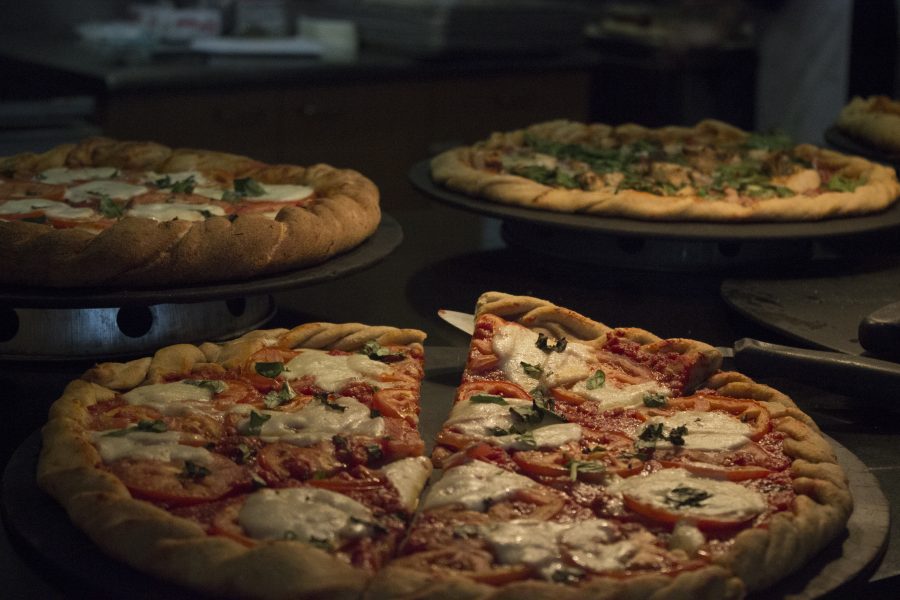If it were true that we are what we eat, I would have become a different person since moving out of Hill Hall.
Instead of eating doughy, end-of-day Subway chocolate chip cookies and living in small lunchbox of a room with my male roommate, I have transitioned to eating Salt & Straw honey Lavender ice cream and live in a slightly larger lunchbox of a room with my girlfriend.
Yes, moving off-campus creates lots of changes, perhaps most especially in personal food consumption patterns.
I have said goodbye to the days of Gwinn and overpriced C-store Skittles and hello to linguini leftovers and Trader Joe’s microwavable rice packets mixed with frozen potstickers.
But even though what I eat and how I eat has changed since moving out of the dorms, my ability to have a more mature, embodied relationship with the things I consume is still grossly underdeveloped.
I use “embodied” in the sense where I feel like I am able and have the desire to make the foods that I want at home — I don’t have to go out to eat well.
It would seem as though the dependent relationship that I have had with on-campus living has bred immature consumption habits. How can I cook and practice good food habits when for the last two years of my independent adult life, access to Gwinn has made it unnecessary for me to cook?
Given the importance of cooking in home life, SPU and other universities should consider introducing cooking classes as a general university requirement. We are not only learning how to learn and how to find a fulfilling career, we are learning how to live.
As I write this I am eating a Nutella, peanut butter and banana sandwich on Safeway white bread, while drinking 2% milk. It is a tasty snack, but more importantly, it was easy to make.
How come I have eaten food my whole life and I still barely know how to make food for myself? Besides my own lack of initiative, it is worth looking at the contained nature of SPU as a potential contributing source of my general food ignorance.
Despite being in the middle of one of the fastest growing cities in the United States, Seattle Pacific University is an island. There is no reason to ever leave campus, no need to wander further than Curbside or Cocina.
Students at SPU are required to live in a dorm for the first two years since graduating high school and to have a corresponding meal plan for the entirety of their time living on campus. Because of this, there is no reason for students to learn self-sufficiency and cook their own food.
It is an option for students to choose a weekly plan with either 21, 14, 10 or seven meals a week, but the plans are identically structured in that students’ money is split between Gwinn meals and dining dollars which can be used at a variety of on-campus eateries.
Don’t cook, stay on campus, eat well.
These messages in no way reflect shortcomings in how SPU provides for on-campus students — it makes sense for the campus to provide for students as they focus on what’s most important: classes.
But where has this left me now that I don’t have the privilege of sliced vegetables and unlimited pizza within steps of my dorm room?
I want to be able to make my own food because it is one of the tastiest ways to represent my own independence. I want to cook because I want to consume the dishes that I produce.
I am 21 years old, I can be drafted into the military, I can drink, I can vote. I am 21 and I eat a lot of Barelli spaghetti because it is cheap and easy for me to make, not because it is necessarily what I want to frequently eat.
Ironically, though I know how to make very few dishes, I am always enthralled and entertained with trendy online food media. Perhaps I will be eating 29 cent Top Ramen and watching YouTube videos of chefs either building creative dishes with liberal amounts of cumin or turmeric (both ingredients that I have no clue as to what they look like when not bottled) or traveling around the world to eat such dishes.
I am much more skilled at consuming food videos than I am at producing food products. I can’t make you enchiladas, but I can tell you that, currently, my favorite YouTube food channel is called “Binging with Babish” and that he has a video on how to make a Krabby Patty.
Perhaps it shouldn’t be the responsibility of YouTube, or even parents, to educate students about how to make food. If we rely solely on parents to teach their children how to cook, children whose parents have less time for child rearing may not learn to be self-sufficient in terms of preparing healthy foods.
SPU fulfills students’ short term needs by providing easy access to nourishment and pizza. But does SPU account for students’ long term needs by creating an environment where students need not learn how to make the foods they regularly consume?
SPU should consider helping students prepare for the future by helping them learn how to prepare their foods. While SPU may have proverbially “taught me how to fish” rather than giving me a fish in terms of skills to prepare me for life beyond college, I have no idea how to cook the salmon I have caught.

















































































